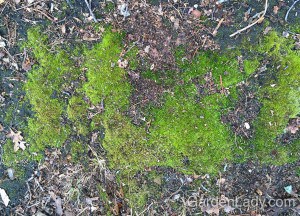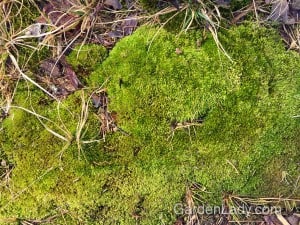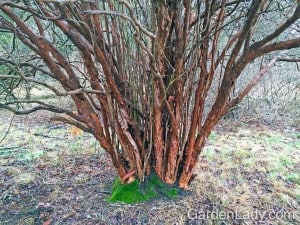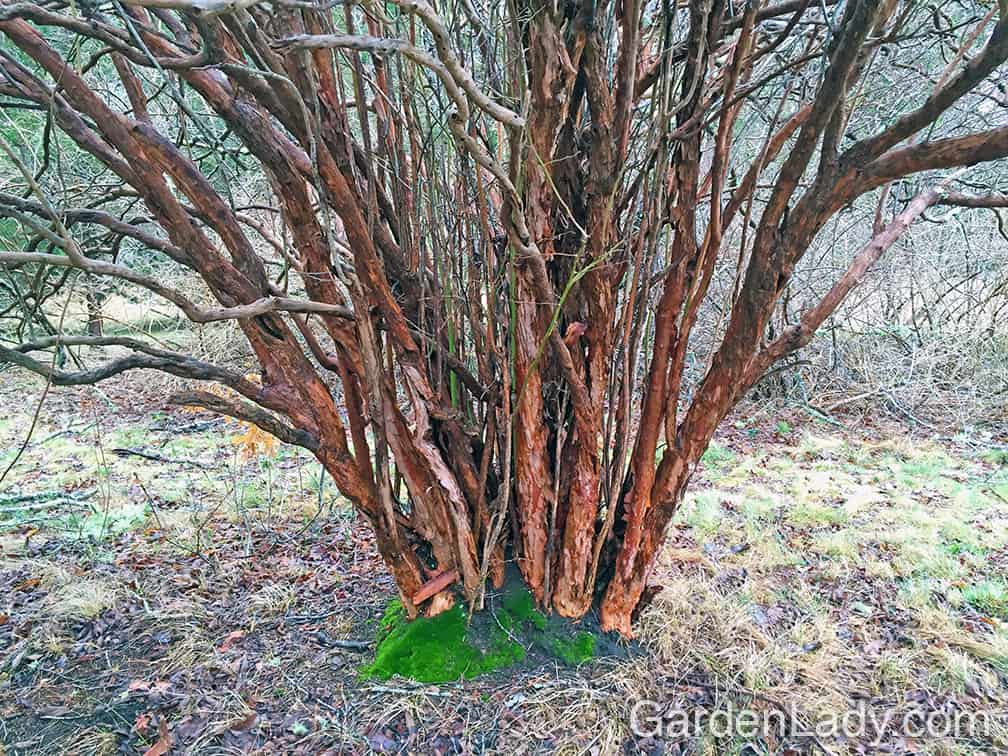In honor of Saint Patrick’s Day I’m going to post about one of the greenest plants in the landscape: moss. On both radio shows I get frequent calls from people who say that their lawn and gardens are being taken over by these plants. “What can I do to get rid of all this moss?” they ask.
Here is what I always answer: Moss grows on compact soil, in shade, and where it’s moist. Any of those conditions will promote the growth of moss. Don’t believe that moss means you have to lime the lawn…this is one of the myths addressed in my book, Coffee for Roses, and it’s completely false. Moss is happy to grow on alkaline and acidic soils.

This moss thrives on a very compact slope where few other plants will grow.
My callers want me to give them an easy solution, and they don’t realize that they have actually invited moss into their garden party. They way lawns and gardens are treated will either discourage moss growth or welcome it in.
The growth of these Bryophytes (the traditional term for this division of plants) often shows that a garden and lawn have been neglected. A lawn that’s been regularly attended to with aeration, top-dressing with compost, mowing high and a sensible fertilization program won’t support moss unless it’s too damp and shady for the grass to grow.
And speaking of damp lawns, most automatic sprinkler systems are set up in ways that encourage moss growth. If you are watering more frequently than once a week, and not allowing the soil surface to dry, you’re sending moss an engraved invitation to move in.
Similarly, many people haven’t noticed that over time their yard has gotten shadier as surrounding shrubs and trees have continued to grow. This creates conditions where grass struggles while the moss thrives…so guess which plant leaves the party early? Yup, your turf.
You can buy moss killer at your garden center, or if you want an organic solution rake the moss off the soil surfaces or mix up one of the baking soda recipes you will find online. But if you don’t change the conditions that promote its growth (shade, moisture, compact soil) it will quickly return.
My question to you is this: do you really want to fight this lovely plant? If your yard is shady, maybe moss is the best plant for that area and you should forget about trying to grow grass. Moss is green 12 months a year and you don’t have to mow or fertilize it. In fact, I suspect that the lawn care industry has convinced people that moss is undesirable because there are more products to be sold for keeping lawns healthy and weed free, but no profit in letting moss grow naturally.
Moss is a fascinating plant. There are around 12,000 species in the division Bryophyta, and they thrive in a wide variety of conditions and habitats. Although mosses photosynthesize like other plants, they lack roots, stems and flowers. And you have to admire a plant that obtains nutrients solely from sunlight and rainwater.
I think moss is a stylishly dressed guest who converses beautifully with the other invitees in Nature’s celebration. Instead of viewing moss as a party crasher, I think of it as an A-list guest at all outdoor gatherings. You want to get rid of moss? WHY???

Moss outcompetes other weeds, making it a good ground cover, especially around other shade plants.

Moss makes lovely “socks and shoes” around this wild high bush blueberry.


Thanks for that, CL. If more garden and landscape communicators keep bringing up these points, a new “moss consciousness” will develop–the same as acceptance for milkweed, native plants, low-mow lawns, pollinator plants, chemical-free yards, and more. I try to give moss the positive place it deserves in every explanation of landscape solutions.
I love your idea of “a new moss consciousness,” Kathleen! Well put.
And as for “socks and shoes” on the blueberry, may I quote you on that? Very clever way of describing this natural association.
I think I’ve heard other people use this term for plants that grow at another plant’s base, so you don’t have to attribute it to me. It’s one of those terms that many gardeners use, I believe…kind of like calling some plants “thugs.” So use away!
But, I would rather have a nice rich grass all summer instead. so????
So then you’ll need to get rid of the conditions that favor moss: shade, moisture, compact soil. Limb up trees, use a shade grass mix, aerate your soil annually, (and perhaps top-dress with compost at least every other year), and water deeply once a week, not more often. Mow grass high (3″) and let the clippings fall on the lawn to amend soil from the top down, which also helps prevent compact surfaces.
Hear, hear! I love moss and am intending to replace some lawn with it. Can you tell me where I can obtain moss plants on the Cape or can I just relocate existing clumps? Thank you.
Caroline,
I don’t know of a source for moss plants on the Cape. You can relocate if you’re moving moss from your own property, but people should never take moss from the wild or conservation lands. Frankly, if you provide those conditions mentioned in this article that favor moss, you’ll get moss appearing! Note: don’t fall for the beer or buttermilk slurry recipes you see online. They are garden myths!
The back portion of our property is bounded by a lovely brook, No surprise then that moss has found a perfectly delightful space to build its ‘home’ and settle in for the duration. Quite content am I to have it as my guest for as long as it chooses to remain. It harkens me back to simpler times, lazy days and a true focus on Mother Nature’s intent. So, in response to your question ~ “WHY get rid of moss?” My thought is to welcome it if you can. Perhaps just sit back in the shade with your favorite drink and enjoy your surroundings. Moss is simply and serenely beautiful in my garden !
I am in total agreement, Raye. A stunning plant!
What about when moss takes over around existing shrubs – will they be killed I love the moss, but have some plants (I paid good money for) nearby that concern me.
I don’t see a duplicate – please respond
Carolyn,
Moss won’t kill shrubs. It might out-compete smaller plants or weeds, but not shrubs. However, moss indicates compact soil and often lower fertility soil since the moss prevents things like leaves or much from decomposing into the ground and feeding the soil and therefore the plants. So if you have moss around your shrubs you might want to, at the very least, apply a liquid organic fertilizer such as fish and seaweed or compost tea around the shrubs once a year to add nutrients.
I have miss iny creeping thyme. What can I do to kill the moss, not the thyme
Unfortunately anything that you apply to kill the moss will also kill the thyme. But let me tell you this, which might help: moss thrives in shade, compact soil, and with frequent watering. Any of those will promote the growth of moss. Thyme thrives in full sun, infrequent watering, and good drainage. Opposite conditions from the moss! So either you have the conditions to grow moss or you have those that will grow thyme. Roll with what you’ve got.
we have moss growing in our outdoor kitchen in between our patio blocks which are in 1/2 shade 1/2 sun. We don’t care for the look and would like to get rid of it. Can you help us?
Thank you!
You could try power washing.